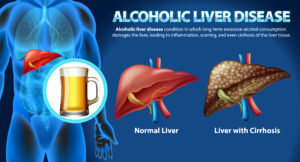
Unnecessary alcohol intake can affect liver wellbeing, bringing about various problems known as Alcohol-Related Liver Disorder (ARLD). Long-term alcohol usage frequently adversely affects the liver, which is a pivotal organ responsible for detoxifying toxic substances. This article delves into the side effects, risks, and treatment decisions for ARLD, all introduced in a concise, user-friendly manner.
What is Alcohol-Related Liver Disorder?
Alcohol-Related Liver Disorder (ARLD) incorporates various liver issues induced by excessive alcohol consumption. The liver separates most of the alcohol taken, but this process produces harmful side-effects that can inflame and destroy liver cells. This can ultimately lead to super durable liver scarring.
ARLD comprises of three phases:
- Alcoholic Fatty Liver Disease: The initial stage wherein fat starts to collect in the liver. It is generally reversible if alcohol drinking is discontinued.
- Alcoholic Hepatitis: It is an inflammation of the liver induced by heavy drinking. This problem may be moderate or life-threatening.
- Cirrhosis: The most extreme stage, wherein the liver is scarred and destroyed, frequently irreversibly.
Symptoms of Alcohol-Related Liver Disorder
ARLD side effects could shift depending on the phase of the condition. Beginning phases might be asymptomatic, but as the problem progresses, more clear signs and side effects arise.
- Fatigue and weakness: Early side effects include fatigue and weakness.
- Loss of Appetite: A noticeable drop in craving might indicate liver pressure.
- Nausea: As the liver struggles to work appropriately, nausea may develop consistently.
- Stomach Discomfort: You may feel pain or discomfort on the upper right side of your abdomen, where the liver is found.
Advanced Symptoms:
- Jaundice: Jaundice is a yellowing of the skin and eyes that indicates the liver’s failure to deal with bilirubin.
- Swelling in the Abdomen (Ascites): Fluid collection in the mid-region, which shows critical liver injury.
- Bruising Frequently: As liver capability reduces, blood coagulation is frustrated, making bruises more normal.
- Confusion or Memory Issues: Toxins accumulate in the brain because of unfortunate liver capability, a condition known as hepatic encephalopathy.
Risk Factors for Alcohol-Related Liver Disorder
While excessive alcohol drinking is the primary cause of ARLD, various factors can impact the opportunity and seriousness of developing the illness.
The risk increases with the sum and duration of alcohol use. Ladies are more inclined to liver injury than males at lower measures of alcohol use.
- Genetic Factors: Certain people may have a genetic vulnerability to alcohol-induced liver disease.
- Weight: Even if you don’t drink too much, being overweight builds your chances of creating fatty liver infection.
- Other Liver issues: Before liver disorders, like hepatitis B or C, could worsen the effects of liquor.
- Gender: Ladies are more powerless against liver harm from alcohol because their systems metabolise alcohol differently.
Treatment Options for Alcohol-Related Liver Disorder
Stopping alcohol intake is the primary treatment for ARLD, as it prevents further harm and allows the liver to fix. The treatment differs as indicated by the phase of the disease.
- Abstinence from alcohol
Stopping alcohol is the most essential move toward treating ARLD. Abstinence can help with turning around harm in the beginning phases of alcoholic fatty liver illness. Even in later stages, giving up alcohol can work on liver function and prevent further weakening.
- Nutritional Support.
Numerous people with ARLD are malnourished because of low liver function and decreased craving. A nutrient-dense diet that advances liver health, with a focus on protein and nutrients, can help recovery. The fact that you consult a dietician.
- Prescriptions
- Corticosteroids: For serious alcoholic hepatitis, specialists might use corticosteroids to limit liver inflammation.
- Anti-inflammatory drugs: A few meds help to reduce side effects like pain or swelling.
- Anti-infection agents: If the liver is fundamentally harmed, infection can create. Antibiotics may be controlled for specific infections.
- Liver transplant.
A liver transplant might be required in cases of extreme cirrhosis, when the liver is no longer functional. This is usually a last resort, requiring lifetime medicine to prevent organ rejection.
Alcohol-Related Liver Disorder is a risky problem, but with the right gastroenterologist in surat, it might frequently be avoided and managed. Perceiving early side effects and making a move — whether by limiting alcohol usage, looking for medical direction, or changing your lifestyle — can have a major effect in your liver’s wellbeing.
